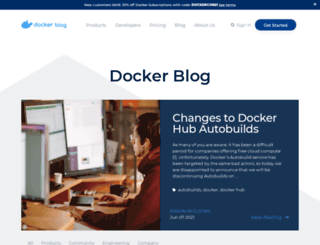Docker Blog | App Development News and Thought Leadership | Docker
Page Load Speed
3.3 sec in total
First Response
165 ms
Resources Loaded
2.5 sec
Page Rendered
633 ms

About Website
Welcome to blog.docker.io homepage info - get ready to check Blog Docker best content for China right away, or after learning these important things about blog.docker.io
Read the Docker Blog to stay up to date on news and updates. New version launches will be announced here. Learn from experts to get the most out of Docker.
Visit blog.docker.ioKey Findings
We analyzed Blog.docker.io page load time and found that the first response time was 165 ms and then it took 3.1 sec to load all DOM resources and completely render a web page. This is a poor result, as 55% of websites can load faster.